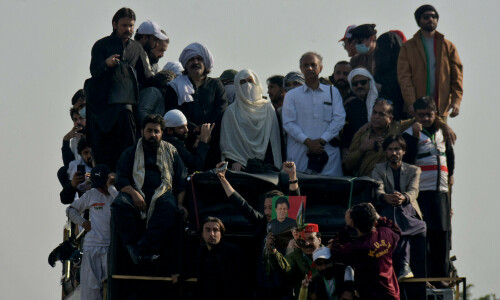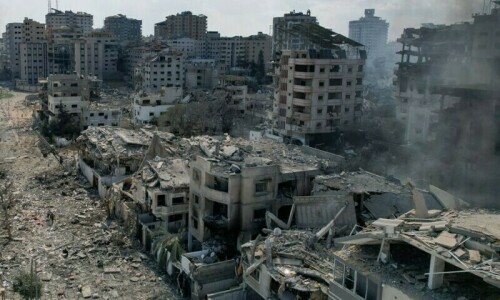PESHAWAR: The so-called North Waziristan agreement has unravelled. It did not require a crystal ball gazer to foretell how far such a hastily done deal would go. However, it did take the government 10 months to recognise that the tribal militants had failed to honour their side of the agreement.
Not surprisingly then, the government now finds itself in a bigger jam than before it rushed into a pact with the radicals in September 2006. However, a public acknowledgement of the fact that the vehemently defended deal has all but collapsed is still awaited.
Quietly and before Washington began reverberating with the National Intelligence Estimate’s claim that Al Qaeda has rebuilt a ‘safe-haven’ in Pakistan, Islamabad had already begun sending more troops into North Waziristan. Clearly, Washington had shared its concerns with Pakistan and it was not for nothing that the military returned to populate check-posts abandoned following the much-trumpeted agreement.
Another surprise came when NWFP Governor Lt-Gen Ali Mohammad Jan Aurakzai was making final efforts to salvage the precious deal just as President Bush came on radio to state: “President Musharraf recognises the agreement has not been successful or well-enforced and is taking active steps to correct it.”
While the American threat to use direct force in the turbulent tribal region serves as the proverbial sword of Damocles, Pakistan’s policymakers, mired in the predicament that is Waziristan, seem to have hit a dead-end in their pursuit for a way out. Notwithstanding the noise from our foreign office on the prospects of American military intervention, it is known that it would not be the first time that Washington will do so. It has carried out strikes in our tribal backyard before. While Pakistan acknowledged some, it remained noncommittal about others to avoid embarrassment at home.
The strikes in December 2005 to kill Hamz Rabia, a key Al Qaeda operational lieutenant, followed by another deadly air strike in Bajaur’s Damadola in January 2006 are some of the known cases of direct American action in the country’s tribal borderlands. However, this does reinforce the fact that responsibility is the price of sovereignty and puts the onus squarely on Pakistan to take control of its tribal belt. The fact that it took Pakistan 10 months to realise that something was seriously amiss with the North Waziristan agreement and that it was without a back-up plan if things fell through, is at best worrying.
As is evident now, the agreement stands flawed on several counts. To begin with, it was misleading to call it a North Waziristan agreement as militants in Waziristan’s regional headquarters, Miramshah, had signed it. Therefore, it was the Miramshah agreement. The extremists in the town have no control over the militant groups in neighbouring Mirali sub-district – the area called a ‘safe-haven’ by the Americans - and despite several attempts, Miramshah tribesmen have failed to win them over. Secondly, the whole nation was led to believe that the September 5 agreement was struck with the Utmanzai tribe. It is now on record that, days after it was signed, the administration coughed up huge sums of money to procure signatures and thumb impressions to cement the eyewash. Had the agreement been with the tribe, the government would not have to send the so-called grand tribal jirga to wait it out in Miramshah.
Instead of the tribe being summoned to explain why it had abandoned the terms of the agreement, the establishment sent the jirga that met emissaries of the tribal militants and not the militant leaders themselves. Ironically, militant leader Hafiz Gul Bahadar, who negotiated with the government, is a Madakhel by tribe and not an Utmanzai.
Why did the government rush into this agreement without doing its homework? The fact is that it appears to have been duped by the JUI-F, which had influence over Hafiz Gul Bahadar and was instrumental in brokering the deal. In the process, the party not only established itself more firmly on tribal terrain but it also managed to position itself as a power-wielder as far as the NWFP and its tribal backwaters are concerned.
However, the true undoing of the North Waziristan agreement is the lack of institutional thinking. As the architect of the agreement and President Musharraf’s pointsman for Fata, General Aurakzai played his cards a tad too close to his chest, leaving all other key stakeholders in the region virtually out in the cold regarding the process. In addition, there was much consternation among power brokers over what seemed at the time to be total capitulation to the militants with terms such as the release of militants, return of weapons, and removal of check posts and payment of compensation.
The problem now is that the situation in Miramshah has worsened to an unusual extent. In a letter to the government, that sounded more like a lamentation, a political agent stated that the khasadars (tribal police) had abandoned their duty without seeking his permission. All those appointed for 599 posts of the levies force had renounced their responsibilities and officers of the line departments had left their offices at the mercy of watchmen. Little wonder then that a line department office and a check-post are blown up every day. Junior tribal officers and moharrirs (clerks) have not reported for work and tribal elders remain too scared to meet the political administration for fear of reprisal attacks from militants. The result, wrote the beleaguered political agent, was that he had to rely on Tochi Scouts to staff the area.
The situation is indeed alarming. The army has sent in thousands of more troops and there is rising anxiety among the people. Security officials believe that much of the American intelligence on the region has come from debriefings of Abu Nasir al-Qahtani, the Saudi Al Qaeda operative who fled the Bagram detention centre in Afghanistan in July 2005. Recaptured in November 2006, he had taken refuge in North Waziristan. Another source, said to be Abdul Hadi Al-Iraqi, a senior Al Qaeda hand believed to have been in the region until captured in December 2006. This, coupled with the American human intelligence network run from across the border and electronic surveillance, say security officials, has provided the Americans with enough material to put more pressure on Pakistan.
Clearly, there are fewer options now. Some senior analysts and bureaucrats point out that although negotiations may still be an alternative, the government cannot afford to go out on a limb to seek a renegotiated agreement from a weaker position. They maintain that history has never sided with the weak and that dictum is truer in the tribal society than anywhere else - where losers have few sympathisers and hordes flock to winners.
Pakistan’s alliance in the war on terror with the US lacks broader political mandate. The parliament is about to complete its term but it has yet to debate an issue of such a great national import.
The multimillion-dollar question before policymakers is how will the government redeem its lost authority and bring itself to a position of strength to negotiate a better agreement. Some officials say that force is an obvious last resort and that the government should try and impose an economic blockade, starting with placing effective restrictions on diesel and petrol to render militants immobile, followed by a crackdown on other items.
According to these officials, the government may consider withdrawing services to those who do not recognise state authority. “This may sound cruel but it is a better option than carrying out full military action that will cause collateral damage and create a bigger mess than we are in now,” said one analyst with experience in political administration.
As one former political agent remarked, “people often think that the stick and the carrot are two different things. They seldom realise that it is the withdrawal of the carrot that becomes the stick to punish people.”













































Dear visitor, the comments section is undergoing an overhaul and will return soon.